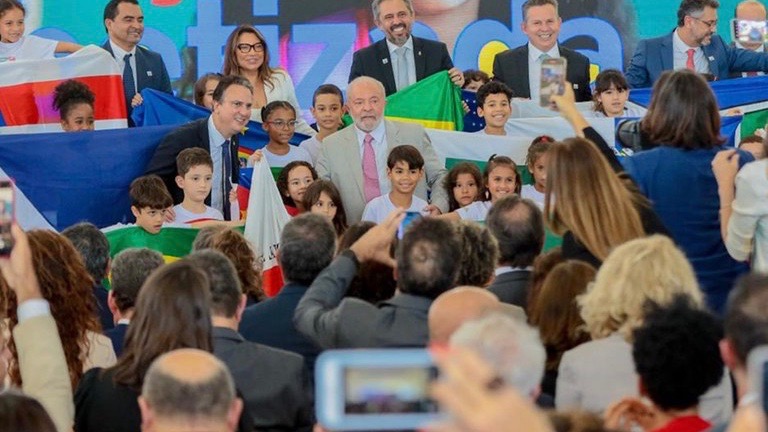Brazilian President Luiz Inácio Lula da Silva, on Monday, June 12, launched a new children’s literacy program called the National Commitment to Literate Children. The initiative will support concrete actions by States, municipalities and the Federal District to promote literacy among all children in the country. For this purpose, the federal government will invest over USD 205 million in 2023 and another USD 410 million in the next three years.
The central objective of the program is to ensure that 100% of Brazilian children receive education at least until the second grade, as set out in the goals of the National Education Plan (PNE) of the Lula government. Additionally, the new plan also aims to recompose curriculum for the 3rd, 4th and 5th grades to recover from the impacts of the COVID-19 pandemic on children’s learning.
During the launch event, from the Planalto Palace, President Lula affirmed that the Brazilian state had “failed utterly” in terms of child literacy in recent years, and accused the government of former conservative President Jair Bolsonaro of having cut the education budget and “abandoning” more than one million children starting primary school.
“The delay in the literacy process occurs because the Brazilian state failed miserably in the last years. It failed because it thought that transferring resources to schools was an expense and would compromise the so-called ‘fiscal balance.’ It failed because it didn’t guarantee quality school meals. It failed because, when the pandemic led to the closing of classrooms, the previous president didn’t demand emergency solutions for education, he preferred denialism and hate speech,” said President Lula after signing the commitment.
“The result could not be any different. Even after having a nationwide public education network improved over decades, Brazil suffered shameful setbacks, setbacks that we will never allow to happen in this country again,” he added.
“Public schools have not yet reached the level of education that we believe is perfect for our people. What we are trying to do is take another step to see if we can make sure that children leave elementary school more prepared than they are today.”
After the publication of the new policy, the federal entities will be able to adhere to it, via the Integrated Monitoring, Execution and Control System (SIMEC). In the following 90 days, States and municipalities are expected to collaborate in the formulation of the territorial policy by way of organizing seminars and public hearings in order to get multiple perspectives from the territory.
The Lula government decreed the new education policy on the World Day Against Child Labor and the National Day to Combat Child Labor. According to different reports, nearly two million children and adolescents between the ages of five and 17 are engaged in child labor in Brazil.
The official data indicates that of the total number of those involved in child labor, 66% are boys, 66% are Black, and 53% of adolescents between 16 and 17 years old. It is an important factor in school dropout. The percentage of children and adolescents in child labor who were out of school is 14%, almost five times higher than the national average of 3%.
With regard to this situation, Laís Abramo, head of the National Secretariat for Care and Family of the Ministry of Social Development and Fight against Hunger (MDS)—an unprecedented initiative in the federal administration created in early 2023, highlighted that “children and adolescents often find themselves in child labor precisely because of the absence of public policies aimed at them and their families.”
“Access to education is a protective factor against child labor, as is access to the social protection network materialized in initiatives such as the Child Labor Eradication Program (PETI) and the social assistance protection network of the Unified Social Assistance System,” added Abramo.
For his part, Wellington Dias, minister of Social Development and Fight against Hunger, stressed that “Education is the fundamental means for the full development of children and adolescents.” He described the National Commitment to Literate Children as “an opportunity to guarantee quality of life to those who need it most.”





